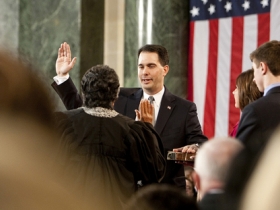Seven Issues That Could Decide 2014 Election
Wisconsin's choice for governor will depend on where voters stand on these issues.

Gov. Scott Walker
The first three years of Republican Gov. Scott Walker has drawn sharp differences between Republicans and Democrats, creating fault lines for November 2014 elections that will determine whether Walker and Republicans keep control of the Capitol.
Here’s a scorecard of six differences, which voters will hear in sound-bite arguments from both sides over and over next year:
–Aid to public schools: Democrats say public schools should get more state aid to replace cuts two years ago that the state has never made up. Republicans boosted state K-12 aid from $5.8 billion this year to $5.9 billion next year and $6 billion the year after that.
But that is still about $180 million less state aid to K-12 schools than in 2010-11, according to the Legislative Fiscal Bureau.
–Aid to private schools: Republican legislators voted for a budget that will expand the voucher program, which lets students attend private schools at state expense, statewide in the 2015-16 school year. Walker first asked to expand the program, now offered only in Milwaukee and Racine, to nine more cities.
Although Republicans say their plan gives every child a chance to flee failing public schools and achieve, Democrats say it amounts to funding an alternative system of K-12 schools without the standards and accountability of public schools.
–Cutting income taxes: All Democratic legislators voted against a budget with a pre-election income tax cut first recommended by Walker in February. Republican legislators almost doubled the size of Walker’s tax cut, raising it to $650 million over two years.
Although Democrats said the tax cut disproportionately favors the rich, Republicans answered that charge this way: In 2011, 15 percent of taxpayers with incomes of $100,000 or more paid 55 percent of all income taxes. So, they said, there was “no way” to design a tax cut that didn’t most help those with top incomes.
–Abortion: The package of anti-abortion bills Republicans offered included requiring women to undergo ultrasounds before having that procedure. Republicans said women need all the information possible before having abortions.
The GOP bill prompted some women legislators to share emotional personal stories and drew this angry response from Senate Democratic Leader Chris Larson: “For the love of Wisconsin, let’s stay out of their vaginas.” Larson will use what he insists is the GOP’s “war on women” to rally Democrats next year.
–Medicaid expansion: Democrats say Wisconsin should have agreed to expand Medicaid health care coverage to more low-income adults because the federal government would pay the entire cost of doing so for two years and then pay at least 90 percent of future expansion costs. Democrats also say Republicans erred by not letting Wisconsin companies design health care purchasing exchanges, scheduled to start Jan. 1.
But Republicans say the financial promises of a federal government that is $17 trillion in debt can’t be trusted, and it’s up to President Obama’s administration to implement the Affordable Care Act.
–Public employee collective bargaining: Democrats want to return to collective bargaining by public employees, most of whom lost that organizing option in 2011. Republicans say the old system was too generous to public workers, so their changes protect taxpayers.
Surprisingly, one other part of the debate over public employee benefits did not emerge this year: Replacing the current system of defined-benefit pensions for public employees with a 401(k) plan. Governments across the nation have made that change to save money.
A 401(k) plan would require workers to determine how to invest their contributions, and contributions to come from the unit of government they work for, and hope they have enough to live on in retirement.
Leaders of public employee unions warned that Walker would push for that, or more damaging changes, when he introduced his budget in February. Although Walker didn’t then, he could recommend a 401(k) plan in early 2015—if he’s re-elected in November 2014.
Ironically, Walker and legislative leaders last week approved a 1 percent pay raise for state workers—the first since 2008.
Steven Walters is a senior producer for the nonprofit public affairs channel WisconsinEye. This column reflects his personal perspective. Email stevenscwalters@gmail.com.
The State of Politics
-
RNC Brings Fame to Gen Z Party Leader
 Jul 15th, 2024 by Steven Walters
Jul 15th, 2024 by Steven Walters
-
Wisconsin’s Republican Roots Run Deep
 Jul 8th, 2024 by Steven Walters
Jul 8th, 2024 by Steven Walters
-
Feuding Supreme Court Justices Need a Break
 Jul 1st, 2024 by Steven Walters
Jul 1st, 2024 by Steven Walters




















